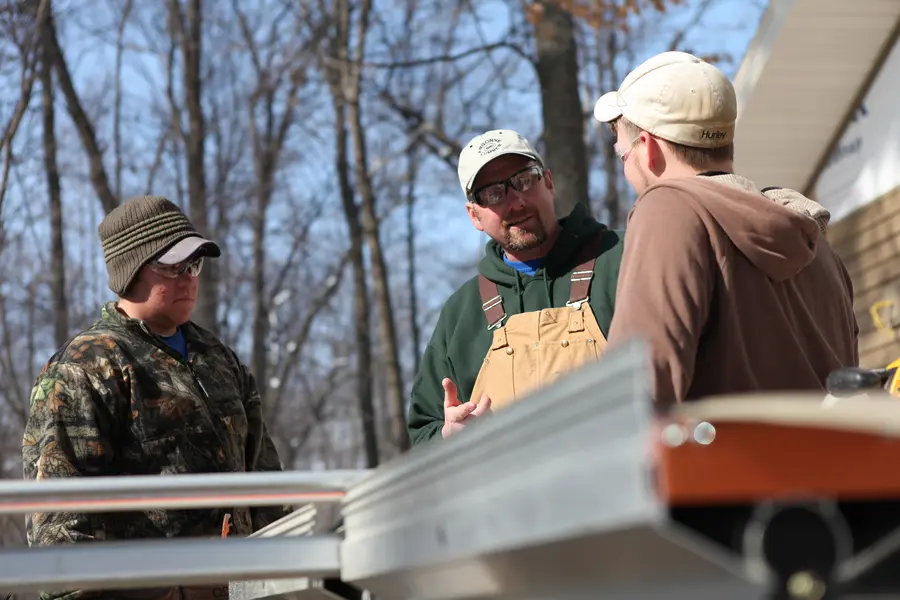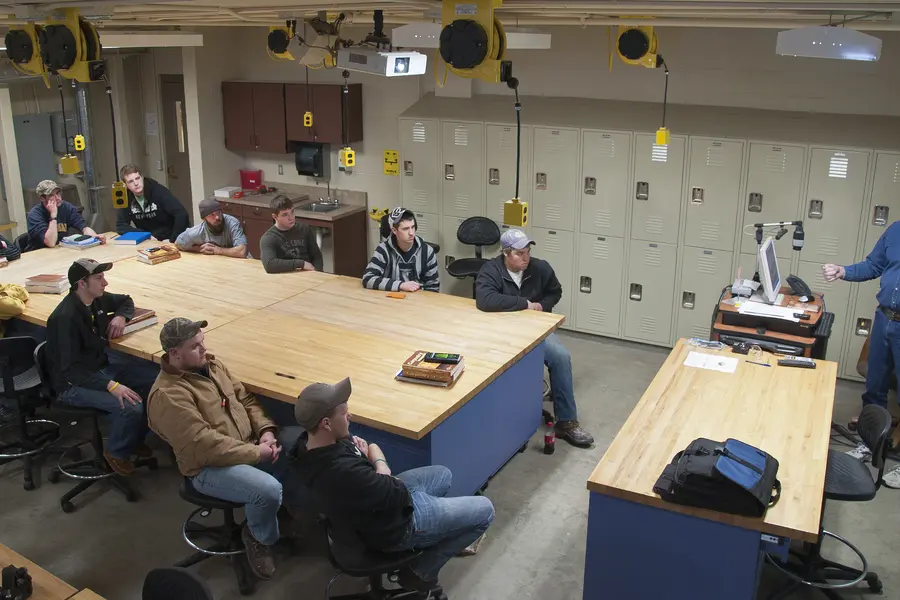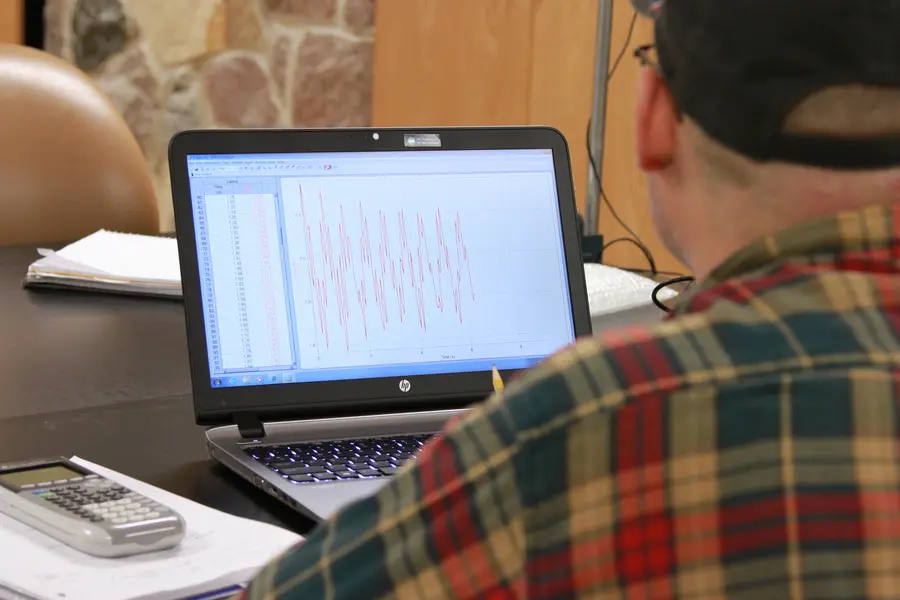Plumbing Apprentice
Learn to install and repair pipes for water, gas, sewage, and drainage systems, and to install and repair sanitary facilities. You'll test your installations to ensure compliance with plumbing code. Work can be indoors or outdoors on existing or new construction projects. Plumbers may work on a ladder/scaffold, in trenches and in various weather conditions. Work requires both stamina and physical strength, working in cramped or uncomfortable positions, and standing for long periods.
Apprentices who complete this apprenticeship have the opportunity to transfer course credits towards the Technical Studies – Journey Worker degree.
Program Outline
| Course # | Course Title | Credits |
|---|---|---|
| 5042775100 | Sanitary Drains 1DescriptionPlumbing related instruction of sanitary drain systems. Course includes a review of codes and trade practices related to sanitary drains, drainage systems, components, and applications. |
2.00 |
| 5042775200 | Vents and Venting SystemsDescriptionDesigned to provide the apprentice with the skills to identify and design sanitary vent piping in a plumbing system in accordance with the Wisconsin Plumbing Code. Focuses on theory, work experience, and the application of plumbing code principles through discussions, drawing exercises, work sheets, and evaluations. |
2.00 |
| 5042775300 | Water Distribution 1DescriptionProvides the apprentice with the skills to identify, design, install, and service various applications for water supply systems listed in plumbing codes. Apprentices will use the code language and tables to in various plumbing systems in accordance with the Wisconsin Plumbing Code. Topics will include commercial to single-family and private well pump systems. Focuses on theory, work experience, and the application of plumbing code principles through discussions, drawing exercises, work sheets, and evaluations. |
2.00 |
| 5042775400 | Water Distribution 2DescriptionProvides the apprentice with the skills to identify, design, install, and service cross connection controls, water treatment equipment and multi-purpose piping systems in various plumbing systems in accordance with the Wisconsin Plumbing Code. Focuses on theory, work experience, and the application of plumbing code principles through discussions, drawing exercises, work sheets, and evaluations. |
2.00 |
| 5042775500 | Sanitary Drains 2DescriptionProvides the apprentice with the skills to identify, design, install, and service various applications for storm water, clear water, and drainage systems. Apprentices will use the code language and tables to in various plumbing systems in accordance with the Wisconsin Plumbing Code. The course focuses on theory, work experience, and the application of plumbing code principles through discussions, drawing exercises, work sheets, and evaluations. |
2.00 |
| 5042775600 | Private Onsite Wastewater Treatment SysDescriptionProvides the apprentice with the skills to identify, design, install, and service various applications for private on-site wastewater treatment systems that are listed in plumbing codes or individual component manuals. Apprentices will use the code language and tables to in various plumbing systems in accordance with the Wisconsin Plumbing Code. Other topics will include pretreatment, soil evaluation, site planning, and new technologies. Focuses on theory, work experience, and the application of plumbing code principles through discussions, drawing exercises, work sheets, and evaluations. |
2.00 |
| 5042775700 | Green Plumbing ApplicationsDescriptionProvides Plumbing apprentices with an introduction to green applications and prepares students to take certification exams: Union Programs: UA Green Awareness Certification (geared toward journey workers, not apprenticeship) WTCS Programs: Green Plumbers USA Certification Program Learning materials from both certificate programs have been incorporated. |
2.00 |
| 5042775800 | Plumbing Advanced Topics TSADescriptionProvides the apprentice with the opportunity to select and complete an applied plumbing project in collaboration with the instructor. Projects will apply the skills required to identify, design, install, and service various plumbing applications that are listed in plumbing codes. Apprentices will use the code language and tables to in various plumbing systems in accordance with the Wisconsin Plumbing Code. The course builds upon the theory, work experience, and the application of plumbing code principles addressed in previous coursework to support completing an applied hands-on project. |
2.00 |
At A Glance
How You'll Learn
On Campus
On Location Training
Program Tuition*
$2,594
Books & Supplies*
$550
*Total cost for degree completion is estimated by current course requirements, books, and supplies. Tuition and fees are set by the Wisconsin Technical College System and subject to change.
Potential Indirect Costs
You may experience these additional costs, not charged by Nicolet, estimated based on length of program.
What You'll Learn
- Apply state plumbing code requirements to the installation and repair of sanitary drain systems
- Apply state plumbing code requirements to the installation and repair of venting systems
- Apply state plumbing code requirements to the installation and repair of water supply systems
- Apply state plumbing code requirements to the installation and repair of storm drain systems
- Apply State plumbing code requirements to the installation and repair of POWTS systems
- Refer to the Wisconsin Administrative Plumbing codes.
- Prepare for journey level licensure examination.
Your Potential Careers
- Journeyman Plumber
Median Annual Salary
| $52,765 | $59,664 | $49,469 |
| Local | State | National |
|---|
EMSI 2022.1
Eligibility
- High school diploma or GED/HSED
- Passing score on Accuplacer or other required tests
- Physical capability of performing the trade
- Valid driver's license or reliable transportation
- Applicants must meet the application and testing requirements of the field they are interested in entering. These rules and policies may vary depending on the requirements of the specific occupation.
- Applicants must be employed prior to starting an apprenticeship. If you do not have an employer, you can still start the application process and go before the committee to receive a Letter of Introduction, which can be taken to potential employers to designate that you are a qualified apprenticeship candidate.
Terms
- 5-year training program
- 8,000 hours of on-the-job training
- 576 hours of paid related classroom instruction
- 260 hours of non-paid related instruction (First Aid, Welding, OHSA, Modules, Blueprint Reading, Transition to Trainer, etc)

Related Programs

Become An Apprentice

